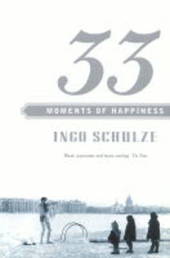
|
33 Moments of Happiness
Paperback
Main Details
| Title |
33 Moments of Happiness
|
| Authors and Contributors |
By (author) Ingo Schulze
|
| Physical Properties |
| Format:Paperback | | Pages:200 | | Dimensions(mm): Height 197,Width 130 |
|
| Category/Genre | Short stories |
|---|
| ISBN/Barcode |
9780330373425
|
| Classifications | Dewey:833.914 |
|---|
| Audience | |
|---|
|
Publishing Details |
| Publisher |
Pan Macmillan
|
| Imprint |
Picador
|
| Publication Date |
10 November 2000 |
| Publication Country |
United Kingdom
|
Description
Each episode in this dazzling debut collection captures the spark in some tiny detail of everyday life in contemporary St Petersburg and fans it into a story that flares with comedy, surreal passion, heartbreaking indifference and mad Russian excess. There's a Mafia shoot-out in a disco, as told by a gun-toting Walter Mitty simultaneously thrilled and horrified by the carnage he is creating. There are three devils who appear for an evening at the steam bath, their revelries ending in cannibalism -- or is the watching manager just mad? These are sad, whimsical, macabre, bleakly funny stories, all told in a playful and voluptuous prose that is itself a homage to the great Russian masters whom Schulze is honouring -- from Gogol to Pasternak, from Chekhov to Nabokov.
ReviewsKirkus Review US:A curious debut collection of linked stories by a young German writer who explores relations between his own country and Russia and various expressions of the Russian temperament, while also offering what seem parodies of - and homages to - Russian writers in both vignettes and fully developed tales that ostensibly constitute "an ongoing discussion concerning the value of happiness." Schulze prefaces the stories with a frame in which a woman traveling by train across Europe to Petersburg enjoys a brief encounter with a German businessman named Hofmann, who leaves behind him a manuscript containing these tales - which the lady passes to "I.S.," urging him to "lend these fantasies your name." The stories, which usually but not invariably observe Russian behavior from a Teutonic viewpoint, variously present comic-grotesque evidence of a people notable for their "vast hospitality" (a woman doctor who administers highly unprofessional last rites, so to speak, to a dying old man is hailed as a "saint"; street vendors seize a wealthy businessman and write their names and addresses on his body), desperate poverty (a widow without means prospers when an American named Nick - and who may be St. Nicholas - marries in succession each of her surviving daughters), and political passion (a widow Communist goes door-to-door defending the Party's ideals; a temperamental painter destroys his canvases because they don't portray the "sufferings of his people" - yet, in so doing, embodies "the despair of the artist"). Nor does Schulze spare his own culture. One story describes a naive traveler's (Hofmann's?) idealization of the prostitute he keeps encountering in hotels, and another recounts the unfortunate fate of a German restaurateur who seeks artifacts from the czarist period as decorations, and unintentionally awakens still-heated memories of WW II. A rather mixed bag, though Schulze's sardonic intelligence and feeling for cultural contrasts give these seemingly disparate tales a pleasing unity and coherence. (Kirkus Reviews)
Kirkus Review US:Written in a vivid and surreal fashion, Schulze captures, through 33 magical episodes, much of the strangeness, savagery and wonder of modern Russia, and the spirit of Peter the Great's new capital, a city of both dreams and harsh realities. Many of the stories are disturbing and macabre, but have a strange gift of wonder and an odd satirical humour. They borrow too from the Russian tradition - Pushkin, Gogol, Chekhov - as well as German fantasy. The book is truly original, thanks to the quirky observations of modern Mafia-riddled Russia and the author's excellent writing. Esperanza's Box of Saints (Kirkus UK)
|